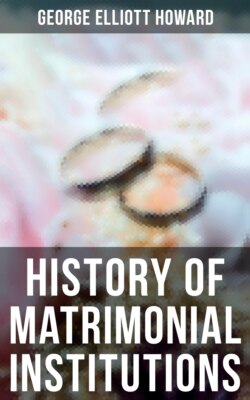Читать книгу History of Matrimonial Institutions - George Elliott Howard - Страница 9
На сайте Литреса книга снята с продажи.
II. CRITICISM OF THE THEORY BY SPENCER AND McLENNAN
ОглавлениеTable of Contents
The patriarchal family of the Ancient Law, whose leading features have now been presented, reappears with slight modification in the later writings of Sir Henry Maine.[25] It has been widely accepted. Yet it was inevitable that a theory which on its face appears to neglect many of the most remarkable facts everywhere observable in the social life of primitive men[26] should arouse most serious doubt. Nor will it do, with Starcke,[27] to excuse the author on the ground that his conclusions are intended to be true only for the domain of the law-books, of comparative jurisprudence; for obviously his language will not bear that construction.
Herbert Spencer was the first writer to subject Maine's hypothesis to a luminous criticism.[28] First he points out that Maine has not been entirely guiltless of "the lofty contempt" entertained by civilized peoples for their barbarous neighbors, which he himself censures as a serious error. For he "has practically disregarded the great mass of the uncivilized" peoples, and "ignored the vast array of facts they present at variance with his theory." Nor, in favor of a primitive patriarchal state, is it safe to assume that "the implicit obedience of rude men to their parents is doubtless a primary fact." For, "though among lower races, sons, while young, may be subordinate, from lack of ability to resist; yet that they remain subordinate when they become men cannot be assumed as a uniform, and therefore as a primary, fact." This objection is sustained by reference to many savage and barbarous tribes among which parents exercise little or no control over the children. Again, it is by no means established that "the history of political ideas begins, in fact, with the assumption that kinship in blood is the sole possible ground of community in political functions." On the contrary, "political co-operation arises from the conflicts of social groups with one another;"[29] and though it may be facilitated by a feeling of common descent, examples of political combination may be produced in which relationship is not considered. Furthermore, it is hard to conceive how so advanced a conception of government as is implied by the patria potestas could exist in the "infancy of society;" nor has it yet been proved that in the primitive state the individual is entirely lost in the family group, which holds all property in common. Instances of "personal monopoly" of property among low races are not wanting. Finally the assumption that in the primordial state women remained in perpetual tutelage is without foundation; how far it is from the truth will be made clear in future chapters.[30]
But the patriarchal theory has been vigorously attacked in its very strongholds, the laws of the Hebrews and the primitive customs of the Indo-Germanic peoples. The well-known polemic of the late J. F. McLennan is of special interest in this connection.[31] Among none of the Aryan races, the Romans only excepted, does he find the patria potestas or the strict rule of agnation; while among them all, he believes, abundant evidence of original promiscuity and of the maternal system of kinship is disclosed. Even the Hebrew Scriptures, where Maine perceives "the chief lineaments" of the patriarchal society,[32] so far from revealing the patria potestas and agnation, bear witness to "beena"[33] marriage and the recognition of kinship in the female line.[34] Sir Henry Maine in this connection refers incidentally to Sir Robert Filmer in whose Patriarchia the existence of the patria potestas among the ancient Hebrews is alleged. But, as McLennan justly observes, "to those who have studied the controversy between Locke and Filmer[35] it may seem wonderful that the truth of Filmer's main position could be thus lightly assumed by anyone, and especially by any lawyer, who had read Locke's masterly reply to the pleadings of his opponent."[36] The principal conclusions of McLennan are sustained in a striking way, for a sister-branch of the Semitic race, by the researches of Wilken and Robertson Smith into the marriage customs of early Arabia.[37] The ancient Hebrews did not have agnation; yet they "traced descent from the father for the purposes of what we may call rank, or a feeling of caste," and this was the source of paternal power.[38] The house-father exercised a high degree of authority over his wives and children, but he can scarcely be regarded as a patriarch in the strict sense of the term.[39]
